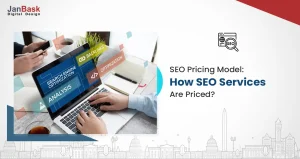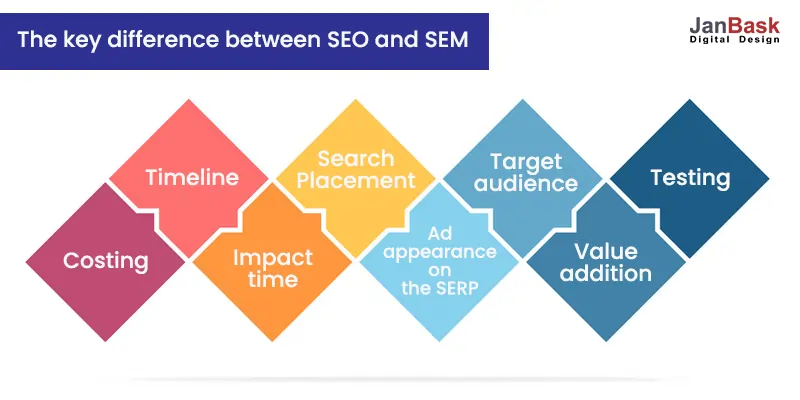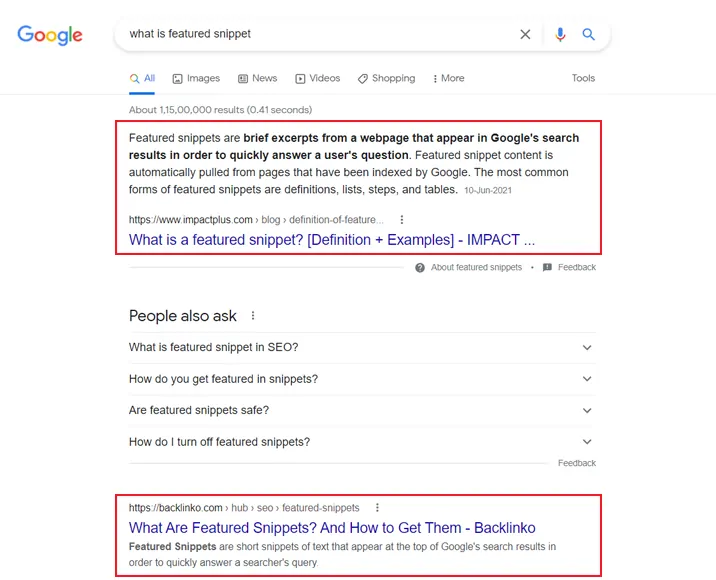
Marketing has significantly evolved over the last decade. There has been a massive rise in the number of options available to businesses for marketing their products and services. However, the increase in options has also led to growing complexity in the marketing jargon. Many terms have been introduced, which can be very confusing for young businesses. It has been seen that many marketers are also confused about the correct meaning and usage of the terms. One such example of terms is SEO vs SEM.
We are here to guide, go through, and clear all confusion related to SEO vs SEM. Through this blog, you’ll learn about:
Ready to dive in?
Looking for SEO Services to Rank Higher?


Search Engine Optimization is a part of SEM or Search Engine Marketing. SEO refers to the process by which a website or an online business maximizes the number of visitors by making sure that the site ranks high on the search result pages. A huge part of the SEO of your website also involves creating superior, high-quality content which is very useful for your target audience.
Thus, gradually the organic traffic of your website is increased. The Google Algorithm changes very frequently, which has also pushed the SEO industry to keep pace with it. Despite these changes, one aspect of SEO remains the same: it is made up of on-page and off-page SEO activities. These tactics confirm that your landing pages, blogs, and even web copies are properly optimized for the search results.
On-Page SEO Activities:
On-page SEO is the practice of optimizing web page content for the users and the search engine. It includes:
Off-Page SEO Activities:
Herein you ensure that Google and other search engines can crawl and index all the search pages of your website. It involves optimizing your website loading time and having a good site architecture.
Search Engine Marketing is a type of marketing undertaken on the internet that involves promoting websites by making an apparent increase in their visibility in SERPs or Search Engine Result Pages by optimization and advertising. SEM incorporates various tactics of SEO and many other search marketing tactics. In addition, SEM also comprises usage of paid search like pay per click (PPC) advertisements.
Many other terms are also employed for a paid search like cost per click, paid search advertising. The advertisements under PPC are usually reflected on SERPs next to various organic listings, thereby increasing the visibility of the web pages of your online business. SEM, thus mainly includes PPC campaigns and activities. Some examples of SEM activities include:
The most important feature of the traffic generated by SEM is that it is targeted when we talk about SEO vs SEM. It is a known fact that search engines are used by people when they look for solutions to various problems or are looking for answers to some specific questions. Over time, it has been noticed that when searches end up in clicking a particular site from the search results, their probability of conversion rises.
The degree of relevancy of various search results and advertisements enhances the usability of SEM traffic compared to other sources. Giants like Facebook and Twitter are also constantly pushing hard for optimization of their advertising platforms for utilizing the targeted traffic, but it is already proven that the traffic which is generated from search engines has much more ROI.
However, search engine optimization and search engine marketing (SEO vs SEM) both play a crucial role in campaign success, but knowing the difference between SEO and SEM will help you understand which one is right for your business needs. Keep reading to learn the key differences between SEO vs SEM.
Interested in our Search Engine Marketing Services?


To answer what is SEO vs SEM, here we have listed the main criteria that will help you understand SEO and SEM and SEO vs SEM marketing.
The basic difference between SEO and SEM is that search engine optimization is a part of search engine marketing. SEM also includes many parts of paid search like PPC and SMM or social media marketing. It thus means that although the basic purpose remains the same, these terms cannot be used interchangeably as they have a fundamental difference that cannot be ignored. SEM is an umbrella term and is usually used for paid search while SEO is used for organic search. This answers the SEO vs SEM difference, to begin with.
Search results that show up as a result of SEM are usually identified as ads while the ones which occur after SEO are not marked like that. In the former case, an icon is also often seen by the placement. Thus, there is a difference in the way the results of SEM and SEO appear as shown below.
Search result in case of SEO - SEO vs SEM comparison

Search result in case of SEM - SEO vs SEM comparison
It has been seen that there is a difference noted in the appearance of search results in both cases. In SEM, ad extensions like phone numbers, callouts, other links, etc. are often included in the search results while in the case of SEO, featured snippets are seen to appear with the search results. Again a major difference between SEO and SEM.
The appearance of search results in the case of SEM:

The appearance of search results in case of SEO:

Specification of the target audience is only possible in the case of SEM although most often both the platforms come with plans for connecting with the select audience. However, in the case of SEM, you can also select your audience more specifically by using various filters like age, location, habits, income, etc. Thus, you have control of who will exactly be able to see your search results. However, in the case of SEO, you focus on the right keywords that will help your website and web content rank better—a critical SEO and SEM difference.
SEM strategy works on paid ads so the results appear before your target audience as and when they search for the desired product and you have better bidding as well. In any case, your audience will rarely miss your ad; it is placed before your target audience in a few clicks, which means that as and when your campaign is launched, your ads start reflecting in SERPs. This defines SEO vs SEM marketing difference.
Their visibility is also in your hands as you can turn them on for increasing the visibility or even turn them off to put an end to showing them any further. SEO, on the other hand, takes time to build up and show the desired results. It depends upon the quality of your copy, right keywords, content originality, and many other factors. However, once your ad starts coming on top of SERP SEO efforts, no matter the time they take it pays off really well. A vital difference between SEO and SEM.
SEM offers a better strategy for testing. It is because the paid ads by SEM can be turned off or on at any time of your choice. SEM allows you to revise the copy of your ads, target new audiences, etc., to measure the effectiveness of your campaign.
In the case of SEO, there are multiple monitoring tools available to track the performance of your keywords and define your further strategy accordingly. This shows the difference between SEO and SEM.
In contrast to SEM, SEO adds value to the strategy and your online business gradually over time. This thus leads to lasting results. SEO also has a better click-through rate than SEM. This is typically true for the first few organic results of the SEO. SEO does leave a lasting impression, but instant results are only possible when you have no competitors.
In the case of SEM, it does a lot of value addition to create instant buzz, so if you're launching a product that already has many competitors, SEM is a better approach initially to maximum eye eyeballs. If you bid, high your ad will be shown prominently and thereby get your fast results. SEM does not give you cumulative results, unlike SEO, wherein results are driven organically.
In SEM, bidding is a crucial part, and you pay for every click or impression on your ad. Therefore, whenever a user clicks on your ad, the advertiser needs to pay, termed Cost-Per-Click (CPC) or CPM (cost-per-thousand impressions).
In the case of SEO cost, the advertiser does not pay anything for the clicks on their ad.
But there is a considerable investment of money, time, and efforts involved in creating the best content, searching relevant keywords, using keyword tools, analyzing performance, resources for managing SEO campaigns, developing backlinks, and much more.
These are some of the key difference between SEO and SEM. Keep reading to learn about whether SEO or SEM works best for your business.

Now that you know the fundamental difference between SEO and SEM, the results, costing, features, and many parameters, which ones should you put 100% effort on? How should your campaign be planned?
Limited Or No Budget: If you are a startup or an SME with a limited marketing budget, going for SEO is the right choice. You don't burn your money in bidding and managing PPC ads that reap results only till the time you keep paying. Instead, it is best to focus on creating the best content strategy, getting resources in place, learning about competition, understanding the world of keywords, and then developing a solid campaign powered by SEO. We have explained how cost impacts SEO vs SEM above.
When the clock is not ticking for you: If time is not an issue and you can play the test match to sharpen your skills before playing one day, SEO is the perfect strategy for you. You create content regularly, put in the best keywords, promote it on relevant platforms, generate great backlinks, and gradually build up your digital presence.
Time is an issue: For instance, you have to launch a festive clothing range. You definitely can't wait for results after the festive, you need to make a timely buzz, and herein SEM works the best.
The budget does not matter - You have a substantial marketing budget to figure out keyword targeting, ad copy, bids, and landing pages that work well together.
You have the bandwidth to manage Ad word accounts - If you have resources to analyze data and manage Google ad accounts, check-in keyword targeting, quality score, conversion rate, CTR, and make the best of analysis for future strategy SEM is just right for you.
Your current performance: If you have a strong organic reach, you should use SEM when coming up with a campaign that requires instant results like limited period offers, discount coupons, product launch, sales led campaigns and many more.
However, the right approach is creating a strategy wherein you can use the power of both SEO and SEM. Working with a digital marketing agency will get you transparency, plan, and the best marketing SEO SEM proposal covering how SEO and SEM can be utilized in the best way and on a limited budget.
After going through the above SEO vs SEM key difference you can make a more informed decision about your marketing strategy. You need to know the extent of competition in your industry and how far you are prepared to dive in terms of marketing, considering the budgetary limits. You may also want to see the strategies used by your competitors, like what kind of search terms they are using for their organic ranks. Finally, you need to weigh your long-term goals and underlying vision when making the final decision, and a robust digital marketing plan.
However, there are many similarities as well between SEO and SEM like:
It is recommended to select both SEO and SEM for better and lasting results that will directly place you above your competitors who are only using one of these. If you require a proposal about the best combination of SEO and SEM for your brand, reach out to us in the comment box below, and we will respond in a fraction of seconds!
Looking for SEO Services to Rank Higher?

A
This is a Great Post. First of all, Both SEO (Search Engine Optimisation) & SEM (Search Engine Marketing) are the major types of Digital Marketing. • Both SEO & SEM help to generate traffic to the website. • Both helps to increase visibility of your site. • But the main difference between them is , SEO is free and responsible for organic traffic/ranking. Where as SEM refers to paid campaign. Appears in the top Google paid ad column.
J
Great Article! Thank you for sharing this is a very informative post, and looking forward to the latest one